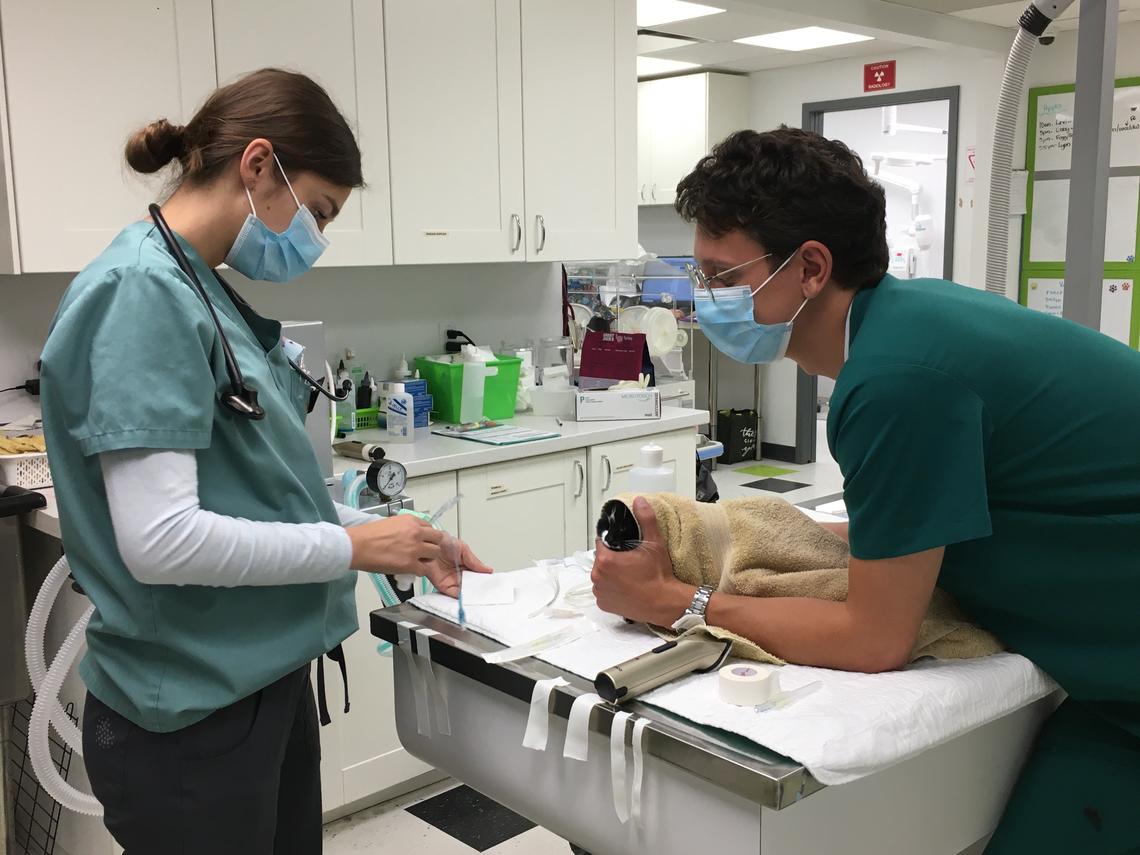March 23, 2021
UCalgary students spend six weeks helping save the life of one very sick rescue dog

When Mississippi arrived at the AARCS (Alberta Animal Rescue Crew Society) facility, the seven-year-old mastiff cross was gravely ill. She had life-threatening anemia, maggot-infested raw sores, swollen back legs, and would not eat or drink.
“When Mississippi came into AARCS care, she was quite sick, which was concerning as we don't have access to 24-hour care being a charitable rescue organization,” says Amy Corpe, clinic manager at AARCS Veterinary Hospital. “The continuing downward trend of Mississippi’s anemia was very worrying.”
- Photo above: Rescue dog Mississippi has made an amazing recovery (pictured here at her foster home) thanks to a team of UCVM students, specialty faculty and AARCS staff. Supplied photo
Before being surrendered to AARCS, the dog had major surgery at an emergency clinic for a septic abdomen — likely the result of her uterus rupturing during a difficult delivery.
“There was a strong possibility of euthanasia, but in consultation with AARCS it was decided we would manage her case and attempt treatment,” explains Dr. Serge Chalhoub, DVM, an internal medicine specialist and senior instructor at the Faculty of Veterinary Medicine (UCVM).

Mississippi is a happy, friendly girl enjoying life with her foster family until she is adopted.
Supplied photo
Team effort by UCVM students, speciality faculty, and AARCS
“UCVM students and faculty helped with Mississippi's case by facilitating her intake wellness exam, performing diagnostics and generating the overall treatment plan for her,” says Corpe. “They also provided day-to-day assessments and discussed as a group the most effective way to manage her case with the resources our organization had available.”
Fourth-year students Rebecca Alexander, Alyssa Chrapko, Jason Kadar and Elspeth Yates had just started their rotation when Mississippi arrived at AARCS. And in this case, the COVID-19 pandemic brought about one positive. Before the pandemic, students would only spend two weeks at the shelter. This year, rotations were lengthened to six weeks as a way to reduce interactions.
“With the longer six-week rotations, our four students were able to start and finish Mississippi’s care, which was really neat,” says Chalhoub. “She was so sick initially and it was great for the students to have the opportunity to help with her care over the course of her recovery.”
Basic medical principles, critical thinking, and lots of TLC
The learning partnership with AARCS was initiated by in 2019 by Chalhoub and Dr. Chantal McMillan, DVM, a senior instructor in small animal medicine at UCVM. For students like Jason Kadar, the experience was invaluable.

Fourth-year vet med students Alyssa Chrapko, right, and Jason Kadar spent six weeks on a practicum rotation at AARCS and helped Mississippi over her long recovery period.
Faculty of Veterinary Medicine
Because AARCS doesn’t have access to some of the advanced diagnostics and equipment found at specialty referral hospitals, Kadar and his fellow students relied on basic medical principles and “lots of TLC” to help Mississippi get better.
“Working within those bounds was really enlightening because you're presented with all these options in school of what you could do, if the medicine allows, if finances allow. Then in the rescue setting you see what options are available and what options are actually financially possible,” says Kadar.
Mississippi’s clinical signs improved to the point there was no longer an immediate risk of organ failure. As the weeks of her recovery progressed, students monitored her condition and she was kept on pain control, anti-nausea medication, antibiotics, and appetite stimulants.
“There's a lot of value in having our UCVM profs right there to walk us through cases, clear up confusion, and really fine tune those clinical exams. And to see how the specialists use their critical thinking to tackle a case, especially one like Mississippi's,” says Kadar. “Drs. Chalhoub and McMillan would chat with all the veterinarians in the morning and if they had questions, they would come to them and also kind of bounce ideas off of them. It’s really collaborative.”
Ready to find a loving home
It was a long ordeal, but everyone involved in Mississippi’s recovery is excited she’s getting a chance for a happy life.
“Mississippi is doing really well in foster care and her foster family has fallen in love with her,” says Corpe. “They said she is the most gentle and sweet dog and they are very happy to have her while she waits to be adopted.







